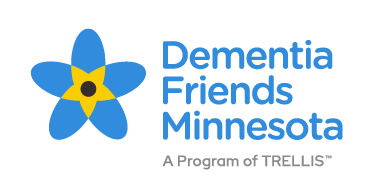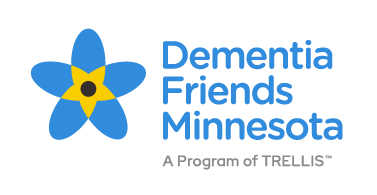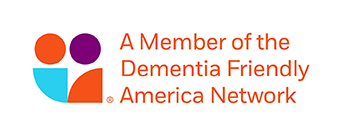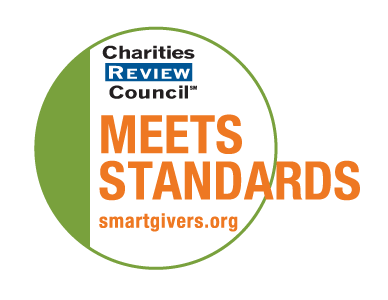Dementia Friends Interview: Geri Svaleson and Kim Alinder
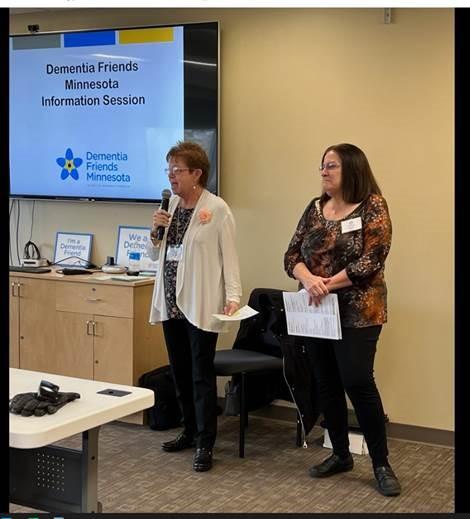
To celebrate the tenth anniversary of Dementia Friends Minnesota, every month we will be featuring Friends who have taken the work to new heights. This month, we spoke to Geri Svaleson and Kim Alinder, Dementia Champions in the Mankato area who after years of working in the aging field teamed up to become a dynamic duo for Dementia Friends.
How did you get involved in this work?
Kim: I was an early member of the Mankato & North Mankato ACT on Alzheimer’s team. I spent my last 26 years in memory care communities as an Executive Director at two different Memory Care facilities, so dementia is near and dear to my heart.
Geri: I started out as a certified nursing assistant in a nursing home, an activity coordinator, administrator, and then I found my way to Assistant Director at Brookdale Mankato. I was really intrigued about what ACT was going to be doing and so ended up joining and getting involved because I’ve worked with dementia my whole career, and my grandma had dementia.
How did you decide to work as a presentation duo?
Kim: We knew each other professionally, then Geri retired in March 2022, and I retired from Birchwood Cottages in June. At the time they were looking for Champions to go out and provide sessions and we said maybe we could do this together.
Co-facilitating has been great. And not that one of us couldn’t run one independently, but I think it brings another atmosphere with two people, two different perspectives. One of us can be looking at the crowd to see if anyone needs additional information at the end but doesn’t want to talk in the session. I think with our experience we can read our crowd pretty well and hopefully meet their needs.
Geri: Typically, Kim starts out and we trade off sections so they're not listening to the same voice the whole time. It’s more of a conversation between the two of us. The section on normal aging can really become a conversation with one of us answering back. We play to our audiences, too. Some of them are professional, some are younger kids, some are care partners, some have no knowledge of dementia at all.
What makes Dementia Friends in Mankato unique?
Geri: We have a lot of college students, so we play to a lot of college students, even with businesses who have students working for them. In some ways I think we influence vocations a bit. We’ve done two sessions with the college so far, with thirty or forty participants each time. A lot of these students become our volunteers, like with the dementia garden, the chorus (ACT Mankato – Singing Hills Chorus), and the Walk to End Alzheimer’s. We get about 100 volunteers from the college for the walk. I think partnering young people with people living with dementia is big. The college students have the patience and the desire to learn. They come away with a whole new perspective.
Kim: One student commented that we had changed her life with the information we shared. She’s going to look into a new profession, and she understands people better now. It was like, wow. That doesn’t always happen.
What does a dementia friendly community look like to you?
Kim: It’s one with great resources, and Mankato & North Mankato ACT on Alzheimer’s have a nice, updated resource guide. It’s one where everyone is welcome, including those who have dementia. It’s a place where businesses know how to serve people better – whether that is a faith community, a retail shop, or barber shop. And it offers opportunities for engagement.
Geri: I think it’s inclusive. It is empowering people with dementia to be involved with their lives and to make choices for themselves. We really push that because sometimes people are not given their voice.
What impact has this dementia friendly work had on Mankato?
Geri: I think more awareness, more empathy. How to assist people with dementia, and just to have patience with them. To give them choices and not too many.
Kim: To give the community the tools they need.
Finally, what advice do you have for Champions or other people who want to get involved in this work?
Kim: Bring energy and positivity to the trainings. Be open and flexible. I would say to co-facilitate. After doing it independently a few times, I’ve found it’s nice to co-facilitate. We’ve worked together so long we can really play off each other and enhance the sessions.
Geri: I think it’s really nice to watch a presentation, then co-facilitate. Then if you want to go on your own you can. But two trainers just makes it more interesting to the people that are there.
